Temporomandibular joint (TMJ) disorders, affecting the jaw joint, are surprisingly often linked to seemingly unrelated symptoms. Many sufferers experience not only jaw pain but also head, neck, and even throat pain. While not a direct cause-and-effect relationship in every case, TMJ can contribute to throat pain through several mechanisms. This article explores the potential connection, addressing common questions and offering insights into diagnosis and treatment.
How Can TMJ Affect My Throat?
The connection between TMJ and throat pain isn't always immediately obvious. It's not that the TMJ directly impacts the throat tissues, but rather that the dysfunction in the jaw joint can trigger a cascade of events leading to throat discomfort. Here's how:
-
Muscle Tension and Referrals: The muscles surrounding the TMJ—masseter, temporalis, medial pterygoid—are interconnected with neck and throat muscles. Chronic TMJ pain often leads to tension in these associated muscles. This tension can radiate pain, creating a referred pain pattern that manifests as throat discomfort. The pain isn't actually in the throat, but felt there due to the interconnected nerve pathways.
-
Postural Changes: TMJ problems often alter posture, leading to forward head posture. This can strain the muscles of the neck and upper back, indirectly affecting throat muscles and potentially leading to pain and stiffness.
-
Inflammation: Inflammation within the TMJ can sometimes spread to surrounding tissues, potentially contributing to throat inflammation and soreness.
What Other Symptoms Might I Experience with TMJ?
TMJ disorders present a wide array of symptoms, making diagnosis sometimes challenging. Besides throat pain, you might experience:
- Jaw Pain: This is the most common symptom, often felt in the joint itself, or radiating to the jaw muscles.
- Headaches: TMJ disorders are frequently associated with headaches, especially tension headaches.
- Earaches: Pain in the ear is another common symptom, often mistaken for an ear infection.
- Neck Pain: Stiffness and pain in the neck frequently accompany TMJ disorders.
- Clicking or Popping in the Jaw: This is a characteristic sound associated with TMJ dysfunction.
- Limited Jaw Movement: Difficulty opening or closing your mouth fully.
- Facial Pain: Pain or tenderness in the face, especially around the jaw.
Can TMJ Cause Throat Pain and Difficulty Swallowing?
Yes, in some cases, TMJ problems can lead to difficulty swallowing (dysphagia). This is usually due to the muscle tension and inflammation mentioned earlier. The restricted movement and pain in the jaw muscles can indirectly affect the muscles involved in swallowing, making the process uncomfortable or difficult.
How is TMJ Throat Pain Diagnosed?
Diagnosing TMJ-related throat pain requires a careful evaluation by a healthcare professional, usually a dentist specializing in TMJ disorders or an oral surgeon. They will assess your medical history, perform a physical examination of your jaw and neck, and may order imaging tests such as X-rays or MRIs to rule out other conditions.
What Treatments Are Available for TMJ-Related Throat Pain?
Treatment for TMJ-related throat pain focuses on managing the underlying TMJ disorder. Options include:
- Pain Relief: Over-the-counter pain relievers like ibuprofen or naproxen can help manage pain and inflammation.
- Muscle Relaxants: In some cases, a doctor might prescribe muscle relaxants to alleviate muscle spasms.
- Physical Therapy: Targeted exercises and stretches can help strengthen jaw muscles and improve range of motion.
- Splints or Mouthguards: These devices can help stabilize the jaw joint and reduce strain on the muscles.
- Injections: Corticosteroid injections can reduce inflammation in the joint.
- Surgery: In severe cases, surgery may be an option, but it's generally considered a last resort.
It's crucial to consult a healthcare professional for a proper diagnosis and personalized treatment plan. Self-treating can delay appropriate care and potentially worsen the condition. Addressing the underlying TMJ disorder is key to alleviating associated throat pain.
